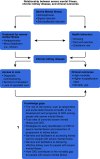Chronic Kidney Disease and Severe Mental Illness: Addressing Disparities in Access to Health Care and Health Outcomes
- PMID: 35361628
- PMCID: PMC9625106
- DOI: 10.2215/CJN.15691221
Chronic Kidney Disease and Severe Mental Illness: Addressing Disparities in Access to Health Care and Health Outcomes
Abstract
Individuals with severe mental illness, including conditions such as schizophrenia and bipolar disorder, are at a higher risk of developing CKD. Higher incidences of CKD in this population can be partially explained by known risk factors, such as the use of lithium treatment and higher rates of cardiovascular disease. However, this does not fully explain the higher proportion of CKD in individuals with severe mental illness, and further research investigating the factors influencing disease onset and progression is needed. Similarly, although it is well documented that mental health difficulties, such as depression and anxiety, are highly prevalent among individuals with CKD, there is a lack of published data regarding the rates of severe mental illness in individuals with CKD. Furthermore, for individuals with CKD, having severe mental illness is associated with poor health outcomes, including higher mortality rates and higher rates of hospitalizations. Evidence also suggests that individuals with severe mental illness receive suboptimal kidney care, have fewer appointments with nephrologists, and are less likely to receive a kidney transplant. Limited research suggests that care might be improved through educating kidney health care staff regarding the needs of patients with severe mental illness and by facilitating closer collaboration with psychiatry. Further research investigating the rates of severe mental illness in patients with CKD, as well as the barriers and facilitators to effective care for this population, is clearly required to inform the provision of appropriate supports and to improve health outcomes for individuals with CKD and co-occurring severe mental illness.
Keywords: chronic kidney disease; depression; disparity.
Copyright © 2022 by the American Society of Nephrology.
Figures
References
-
- Siddiqi N, Doran T, Prady SL, Taylor J: Closing the mortality gap for severe mental illness: Are we going in the right direction? Br J Psychiatry 211: 130–131, 2017 - PubMed
Publication types
MeSH terms
LinkOut - more resources
Full Text Sources
Medical


